英语1(基础模块)第2版--unit-2-知识点及练习
英语基础模块1-unit2-i-can-do-it-课件
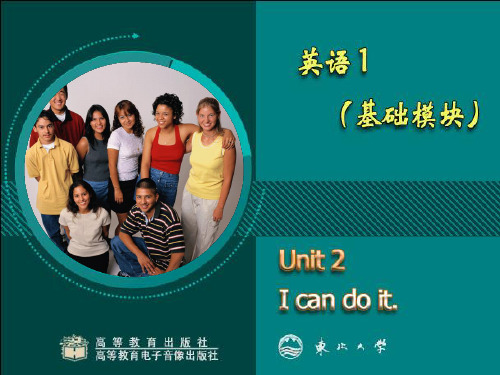
Mr Zhang: Can you sing English songs?
Bill:
Yes, I can.
Mr Zhang: That’s good.
Activity 7
Listen and repeat. 跟读对话,学说选出的语句。
Bill:
Good morning, sir!
Mr Zhang: Good morning! Your name, please?
Activity 5
Listen and circle. 听录音,在活动4的字母序号上圈出张 青能做的事。
a. I can drive a car.
c. I can use the computer.
e. I can serve visitors.
Activity 6
Read and underline. 阅读对话,用下画线标出询问和谈 论能力的语句。
Activity 2
Listen and circle. 听录音,圈出上图中Ben能做的事。
1) I can speak Chinese.
5) I can teach English. 6) I can drive cars.
Activity 3
Think and talk. 想一想,与同伴谈论自己能做的事。
教学目标
语言知识目标: 学生能够理解并运用常用动词及can 询问并给出有关个人能力的信息。 语言技能目标: 听 —— 学生能够理解用情态动词can 表述的有关个人能力的介绍。 说 —— 学生能够用情态动词can 做有关个人能力的介绍。 读 —— 学生能够读懂有关个人信息及个人能力的表格及简单句。 写 —— 学生能够根据个人情况做简单介绍并用情态动词can 表述个人能力。 学 习 策 略: 学生在英语学习中发现问题并及时寻求解决方法。 文 化 意 识: 学生掌握中国人与英美国家的人们在询问个人信息时的不同习惯。 情 感 态 度: 学生了解不同职业所需的技能,并明确自己在学习过程中需要掌握的技能。 单 元 任 务: 学生能够运用所学语言填写简单的求职表。
高教版中职英语基础模块一 Unit 2 Listening and Speaking精美课件
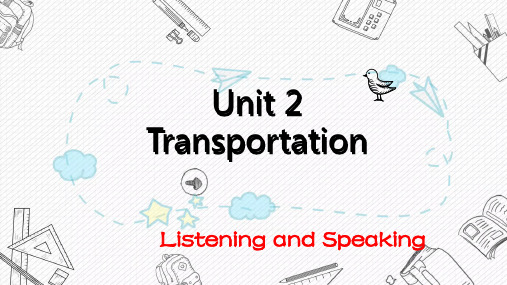
她向窗子的方向看了看,无奈什么也没有。
Language points analysis
Visitor: Oh! Maybe I should get off and take a taxi.
how long 多久 Eg: How long have you studied English?
你学英语多久了?
Language points analysis
Li Zixuan: Don’t worry about it. It’ll only take about half an hour. By the way, it’s much greener than taking a taxi.
Expressions
go straight go along
Expressions
Hale Waihona Puke turn leftturn right
Expressions
crossroads
turning
Think and act.
根据以下校园地图和提示信息,以校门为起点,进行问路与指路的简单对话。
Excuse me, could you tell me how to go to the …?
much 修饰比较级,much greener “环保得多”green 意为“环保得”
by the way 顺便一提
补充:
on the way home on the way to …
在回家的路上 在去…的路上
Eg:顺便一提,你的手机号码是多少?
word完整版牛津高中英语模块一unit2知识点讲解
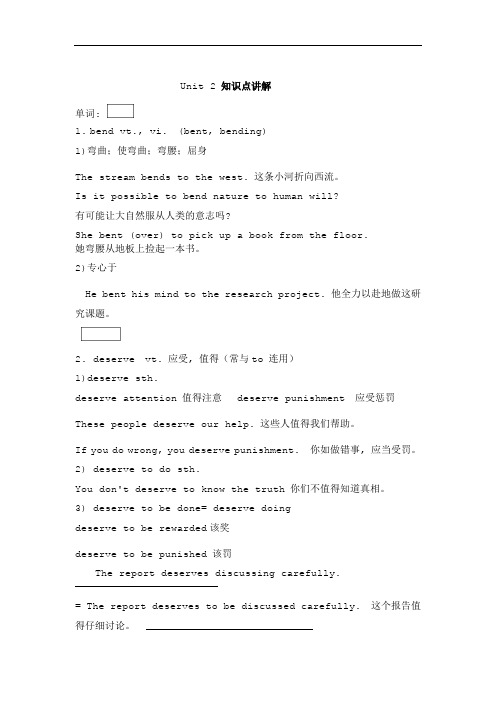
Unit 2 知识点讲解单词:1.bend vt., vi. (bent, bending)1)弯曲;使弯曲;弯腰;屈身The stream bends to the west. 这条小河折向西流。
Is it possible to bend nature to human will?有可能让大自然服从人类的意志吗?She bent (over) to pick up a book from the floor.她弯腰从地板上捡起一本书。
2)专心于He bent his mind to the research project. 他全力以赴地做这研究课题。
2. deserve vt. 应受, 值得(常与to 连用)1)deserve sth.deserve attention 值得注意 deserve punishment 应受惩罚These people deserve our help. 这些人值得我们帮助。
If you do wrong, you deserve punishment. 你如做错事, 应当受罚。
2) deserve to do sth.You don't deserve to know the truth 你们不值得知道真相。
3) deserve to be done= deserve doingdeserve to be rewarded该奖deserve to be punished 该罚The report deserves discussing carefully.= The report deserves to be discussed carefully. 这个报告值得仔细讨论。
3. expect vt. expect (sb.) to do sth.1) 预料;预期I expect he'll pass the examination. 我预料他会通过考试。
M1U2基本知识点

M1U2基本知识点Module 1 Unit 2 Growing pains 基本知识点教学目标:1. 掌握本单元的基本词汇,包括中英文和词性的转换,能在阅读中读懂文章。
2. 掌握基本短语,包括介词短语,动词短语,常用词的固定搭配。
3. 掌握基本句型,并根据所学句型能够翻译句子。
4. 掌握定语从句的基本用法,知道关系副词的运用,能够做一些简单练习。
一.基本词汇:1.容忍,允许2.行为,句子3.辩解,辩白;防御,保护4.解释,说明(n)5.处理,对付6.坚持,坚持认为7.争吵,辩论,论点,论据8.耐心9.自私的10.疏远的,遥远的11.禁止12.正常的,常规的,一般的13.限制,极限,界限14.独立(n)15.平衡,抵消16.curtain17.frightened18.bend19.starve20.adult21.fault22.emergency23.deserve24.sigh25.error26.guidance27.freedom28.annoyed29.confused30.wisdom教学要求:给定中文的要求学生会读,会写,会用;给定英文的要求学生认识单词,有助于学生词汇量的扩大。
二.词性转换:1.frightened (动词) →__________2.bend (过去式) →__________ (过去分词)→__________3.starve (名词) →__________4.sink (过去式) →__________ (过去分词)→__________5.tolerate (形容词) →__________ (名词)→__________6.behavior (动词) →__________7.emergency (形容词) →__________8.explanation (动词) →__________9.chat (过去式) →__________ (过去分词)→__________ 10.argument (动词) →__________11.freedom (形容词) →__________ (副词)→__________12.harm (动词) →__________ (形容词)→__________13.patience (形容词) →__________ (反义词) →__________14.annoyed (动词) →__________15.forbid (过去式) →__________ (过去分词) →__________16.misunderstand (名词) →__________17.confused (动词) →__________18.limit 动词) →__________ (形容词)→__________20.balance (形容词) →_________19.wisdom (形容词) →__________教学要求:掌握基本词汇的名词,动词,形容词等的词性转换,有助于学生任务型阅读方法和技巧的提高。
基础模块2(unit1-2)

t1-2. 一般过去时一、写出下列单词的过去式am/i _______ are _______ begin ______ bring_______ buy _______ can _______ come _______ do/does_______ drink _______eat _______ feel_______ find_______ forget_______ get_______give_______go_______ have/has_______ hear _______ learn_______let_______ lose _______ make _______ meet _______ pay_______put _______ read _______ ride_______ run _______ say _______see _______ sing_______ sit_______ sleep_______ speak _______spend _______stand_______swim_______take_______teach______tell _______ think _______ write__二、单项选择:从下列各题后所给的四个选项中选择最佳答案填空。
(10) ( )1.My father______ill yesterday.A.isn't B.aren't C.wasn't D.weren't( )2.______your parents at home last week﹖A.Is B.Was C.Are D.Were( )3.The twins______in Dalian last year.They______here now.A.are; were B.were; are C.was; are D.were; was ( )4.______your father at work the day_____yesterday(前天)﹖A.Was; before B.Is; before C.Was; after D.Is;after( )5.—Who was on duty last Friday﹖—______.A.I am B.I was C.Yes, I was D.No, I wasn't ( )6. I cleaned my classroom ___________.A with three hoursB three hours agoC in three hoursD three hours before( ) 7. I came _______ my house two days ago .A back onB back toC to back Dback( ) 8 . ___________? He did some reading at home.A What does your father do yesterday eveningB What does your brother do in the schoolC What did your brother do over the weekendD Where did your brother go last Sunday( ) 9. What did you do ________ ? I went to the movies.A next morning Bover the weekend C in the weekend D nextMonday( ) 10. The koala sleeps _______,but gets up _________.A during the day; at the eveningB at day ;duringnightC in the day ;during the eveningD during the day ; atnight三、请用正确动词形式填空。
(完整版)英语1(基础模块)第2版-unit-2-知识点及练习,推荐文档.docx
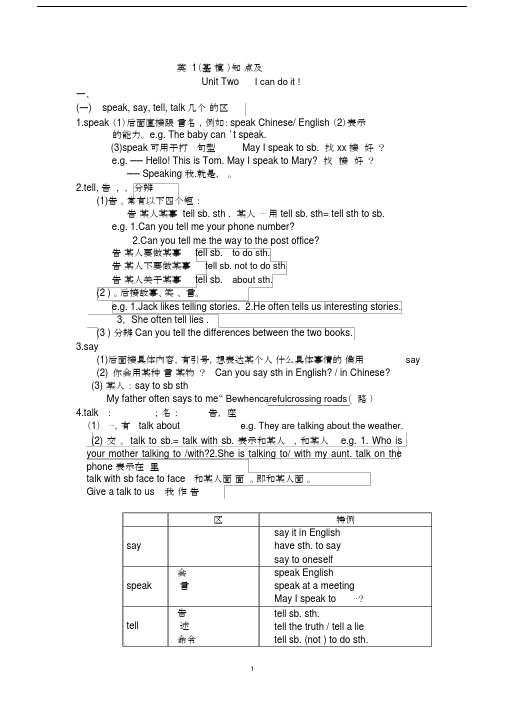
英 1(基模)知点及Unit Two I can do it !一、(一) speak, say, tell, talk几个的区1.speak (1)后面直接跟言名,例如:speak Chinese/ English (2)表示的能力。
e.g. The baby can ’t speak.(3)speak可用于打句型May I speak to sb. 找 xx 接好?e.g. —— Hello! This is Tom. May I speak to Mary? 找接好?—— Speaking 我.就是,。
2.tell, 告 , ,分辨(1)告。
常有以下四个短:告某人某事 tell sb. sth . 某人⋯用 tell sb. sth= tell sth to sb.e.g. 1.Can you tell me your phone number?2.Can you tell me the way to the post office?告某人要做某事tell sb.to do sth.告某人不要做某事tell sb. not to do sth告某人关于某事tell sb.about sth.(2 )。
后接故事、笑、言。
e.g. 1.Jack likes telling stories. 2.He often tells us interesting stories.3, She often tell lies .(3 ) 分辨 Can you tell the differences between the two books.3.say(1)后面接具体内容,有引号,想表达某个人什么具体事情的候用say(2)你会用某种言某物? Can you say sth in English? / in Chinese?(3)某人: say to sb sthMy father often says to me“ Bewhencarefulcrossing roads(路)4.talk :;名:告,座(1)⋯,有 talk about e.g. They are talking about the weather.(2) 交。
Unit 2 英语1 (基础模块)第二版

I Grammar focus You He / She / It
I You He / She / It Can We You …?
We
You They
can / can’t …
They
I You He / She / It Yes, can No,
I you he / She / It Can’t
speak Chinese teach English drive a car read in Chinese repair computers serve customers
serve customers. I can ______________________
1. Look and complete.
speak Chinese teach English drive a car read in Chinese repair computers serve customers
repair computers. I can ______________________
1. Look and complete.
Objective Sales Manager Abilities I can use the computer. I can speak English. I can read and write in English. …
( (
) a. His name’s Wang Tong. ) c. He can speak English.
5. Listen and complete.
Name: From:
Zhang Qing Qingdao 28
Age:
……
6. Listen, read and underline.
中职英语 基础模块1 Unit2
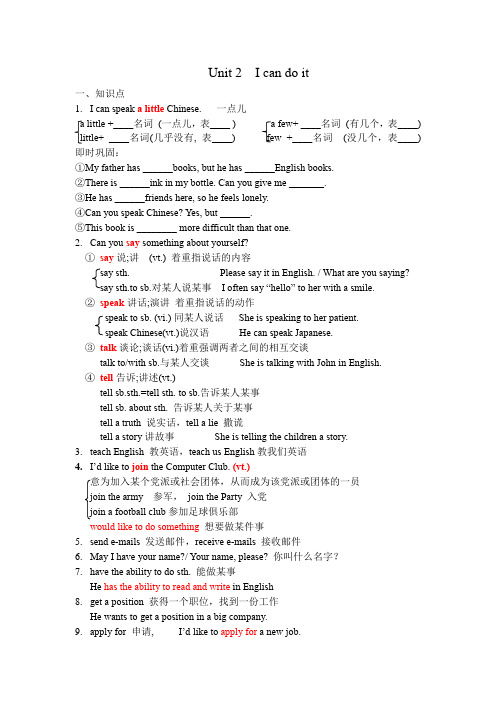
Unit 2 I can do it一、知识点1.I can speak a little Chinese. 一点儿a little +____名词(一点儿,表____ ) a few+ ____名词(有几个,表____) little+ ____名词(几乎没有, 表____) few +____名词(没几个,表____) 即时巩固:①My father has ______books, but he has ______English books.②There is ______ink in my bottle. Can you give me _______.③He has ______friends here, so he feels lonely.④Can you speak Chinese? Yes, but ______.⑤This book is ________ more difficult than that one.2.Can you say something about yourself?①say说;讲(vt.) 着重指说话的内容say sth. Please say it in English. / What are you saying?say sth.to sb.对某人说某事I often say “hello” to her with a smile.②speak讲话;演讲着重指说话的动作speak to sb. (vi.)同某人说话She is speaking to her patient.speak Chinese(vt.)说汉语He can speak Japanese.③talk谈论;谈话(vi.)着重强调两者之间的相互交谈talk to/with sb.与某人交谈She is talking with John in English.④tell告诉;讲述(vt.)tell sb.sth.=tell sth. to sb.告诉某人某事tell sb. about sth. 告诉某人关于某事tell a truth 说实话,tell a lie 撒谎tell a story讲故事She is telling the children a story.3.teach English 教英语,teach us English教我们英语4.I’d like to join the Computer Club.(vt.)join the army 参军,join the Party 入党join a football club参加足球俱乐部would like to do something想要做某件事5.send e-mails 发送邮件,receive e-mails 接收邮件6.May I have your name?/ Your name, please? 你叫什么名字?7.have the ability to do sth. 能做某事He has the ability to read and write in English8.get a position 获得一个职位,找到一份工作He wants to get a position in a big company.9.apply for 申请, I’d like to apply for a new job.10.I can serve customers 为顾客服务,serve sb. 为某人服务11.get upset 感到不安Now, don’t get upset about your illness.get angry变得生气If you do that again, I'll get angry.二、语法: can 的用法情态动词;没有人称和数的变化;后接动词原形;①表示能力,意为“能、会”,可与be able to转换。
- 1、下载文档前请自行甄别文档内容的完整性,平台不提供额外的编辑、内容补充、找答案等附加服务。
- 2、"仅部分预览"的文档,不可在线预览部分如存在完整性等问题,可反馈申请退款(可完整预览的文档不适用该条件!)。
- 3、如文档侵犯您的权益,请联系客服反馈,我们会尽快为您处理(人工客服工作时间:9:00-18:30)。
英语1(基础模块)知识点及练习Unit Two I can do it !一、词汇(一) speak, say, tell, talk几个词的区别1.speak (1)后面直接跟语言名词,例如:speak Chinese/ English(2)表示说话的能力。
e.g. The baby can’t speak.(3)speak可用于打电话时句型May I speak to sb. 请找xx 接电话好吗?e.g. ——Hello! This is Tom. May I speak to Mary? 请找玛丽接电话好吗?——Speaking .我就是,请讲。
2.tell, 告诉, 讲,分辨(1)告诉。
常有以下四个短语:告诉某人某事tell sb. sth . 给某人讲… 用tell sb. sth= tell sth to sb.e.g. 1.Can you tell me your phone number?2.Can you tell me the way to the post office?告诉某人要做某事tell sb. to do sth.告诉某人不要做某事tell sb. not to do sth告诉某人关于某事tell sb. about sth.(2 )讲。
后接故事、笑话、谎言。
e.g. 1.Jack likes telling stories. 2.He often tells us interesting stories.3,She often tell lies .(3 ) 分辨Can you tell the differences between the two books.3.say 说(1)后面接具体内容,有引号,想表达某个人说什么具体事情的时候用say(2) 你会用某种语言说某物吗?Can you say sth in English? / in Chinese?(3)对某人说:say to sb sthMy father often says to me “Be careful when crossing roads(过马路时)4.talk 动词:谈;名词:报告,讲座(1)谈论…,有词组talk about e.g. They are talking about the weather.(2)谈话交谈。
talk to sb.= talk with sb.表示和某人说话,和某人谈话e.g. 1. Who is your mother talking to /with?2.She is talking to/ with my aunt.talk on the phone 表示在电话里谈talk with sb face to face 译为和某人面对面谈话。
即和某人面谈。
Give a talk to us 给我们作报告1,Sorry, but I can’t hear what you said just now?Could you _________ it again more slowly, please?2,The monitor asked the classmates to stop ____________ because he had something important to ___________ them.3. The students are about the film in the room.4. Please clearly.5. Two men are in front of the house.6. They can a little English.8. Can you me what time it is? 9. Mary , “What a nice idea!”1. He’s going to borrow books from the library.2. This cup has milk in it .Please give me more.3. I have friends in Beijing.4. He knows only English.5. I got a letter from my friend ___ __ days ago .6. The text is difficult for you, there are new words in it.7. I have only friends, but they are all good friends.8. This question is difficult, ___ ___ student can answer it.9. Though this question is difficult, ____ __ students can answer it.10. Don’t worry, there is _______ time before the train leaves.11. Don’t worry, you still have time.12. Hurry up, there is ___ ___ time left.(三) 表示‘人、语言’ Chinese , English, French1,Chinese n. 中文,汉语(不可数名词);中国人(可数,单复同形)I am Chinese . We are Chinese.adj. 中国的,中国人的;2,English 英语,英国人(无复数)adj. 英语的,英国人的;He is English. He is an Englishman. He is an English boy.3,French 法语法国人(无复数)adj. 法语的,法国人的;He is French. He is a French man. He is a French boy.表示国家:China = the PRC , England = Britain = the UK , France. (四) in, 在……里面,用,穿in the room. 在房间里面,in English. 用英语,the girl in red. 那个穿红衣服的女孩二、短语Use the computer repair the computer drive a car read in Chinesein English teach English speak Chinese serve customers play basketball play baseball ride a bike what positionapply for want to be would like to do sth sales managerget upset (变得)不安get angry 生气三、句型1,Do you speak English?(你说英语吗?)是问你平时说英语吗?Can you speak English?(你能/会说英语吗?)can 指能\会做某事2,May I have your name, please? = What’s your name?你叫什么名字?3,How old are you? = What’s your age? 你多大了?4,That’s it. = That’s all. 好了,到此为止。
5,I’d like to = I would like to , would like : 想要。
后面可以接名词,不定式。
I would like a little water . I would like some apples.I would like to play basketball. I would like to ride a bike.(to后面接动词短语)四、语法情态动词can的用法can的意思,一表示能力:能、会;二表示许可:可以一、can的用法:情态动词can后面跟动词原形。
主语无论何种人称单复数,情态动词不能变。
二、情态动词can可以引导肯定句和疑问句。
1、肯定句:主语+ can + 动词原形+ 其他成分2、疑问句:can + 主语+ 动词原形+ 其他成分三、can 引导的肯定句变为疑问句的方法:(一调二改三问号)1、can 提前,首字母大写。
(一调)2、肯定句中主语在变成疑问句时的变化。
(二改)如:肯定句:You can see the animals. 你能看见动物。
疑问句:Can you see the animals? 你能看见动物吗?3、在句尾后面加问号。
(三问号)四、回答:1、肯定回答:Yes,主语(必须人称代词)+ can.2、否定回答:No,主语(必须人称代词)+ can not (can’t).专题训练一、将下列句子变成一般疑问句并根据要求回答问题Example:Harry can run .(Yes)Can Harry run ? Yes , he can . He can run .1、Miss Smith can play ping-pong.(No)________________________________________________________________? _________________________________________________________________ 2、Jessie can play the drum(鼓) . (Yes)________________________________________________________________? _________________________________________________________________ 3、Tony can sing . (No)________________________________________________________________? _________________________________________________________________ 4、Nancy can draw a house .(Yes)________________________________________________________________? _________________________________________________________________ 5、Peter can play computer games .(Yes)________________________________________________________________? _________________________________________________________________ 二、根据划线部分提问例:I can play basketball. What can you play?I can play basketball. What can you do?1, Sara can swim._____________________________________________________________ 2, I can play the violin(小提琴) ._____________________________________________________________ 3, You can get pizzas .______________________________________________________________ 4, Sandy can read and write in English.______________________________________________________________ 5, We can wash the vegetables.______________________________________________________________ 二、翻译他会打棒球(baseball)。
